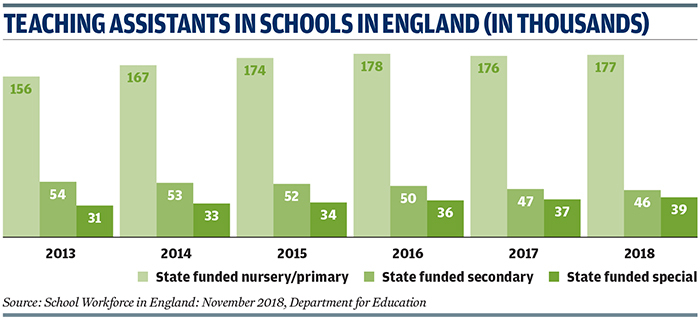Education - Children's Workforce Qualifications and Training Guide
Charlotte Goddard
Monday, August 26, 2019

Head teachers say cuts to school funding mean they are being forced to reduce numbers of teachers and support staff. However, the number of full-time equivalent teaching assistants (TAs) rose slightly in 2018 driven by an increase in TAs in special schools.
TAs make up 27.9 per cent of the school workforce and are graded from 1 to 4. The role of higher level teaching assistant was brought in by the government for those who wanted to progress in their career. Higher level TAs should hold a nationally recognised qualification at Level 2 or above in English and maths and must meet a set of 33 standards. A new Teaching Assistant Apprenticeship Standard was launched in June this year. Cache's new suite of qualifications include the Level 3 Diploma in Supporting Teaching and Learning. It has extended its Level 3 Diploma in Specialist Support for Teaching and Learning in Schools and Level 2 Certificate in Supporting Teaching and Learning in Schools until August 2020.
Maximising the Impact of Teaching Assistants is a programme of school workforce improvement and training delivered by the University College London Centre of Inclusive Education at the Institute of Education. The Education Endowment Foundation offers a free online course to help schools rethink the way TAs are deployed and trained. The Welsh Government published a set of professional standards for TAs and higher level TAs in July.

The National Association for Special Educational Needs (Nasen) was awarded a £3.4m contract in 2018 to help schools identify and meet training needs around special educational needs and disabilities (SEND). This is being delivered through the Whole School SEND Consortium (WSS), which has appointed regional SEND leaders and deputies across England.
Special educational needs co-ordinators (Sencos) must be qualified teachers. Since 2009, newly appointed Sencos without more than a year's past experience of the role must achieve a postgraduate National Award in Special Educational Needs Co-ordination within three years of appointment. The National Award for Senco Providers Group this year launched an induction pack for new and aspiring Sencos. This year WSS is staging free regional continuing professional development events, as well as providing SEND Reviewer training to education leaders and experienced Sencos.
Nasen's SEND Gateway has been extended to bring together research, resources and best practice from across the sector. Nasen also offers bespoke training, mental health first aid training, online learning and resources for practitioners.
From September 2020, health education will become compulsory in all state-maintained schools as will relationships education in primary schools and relationships and sex education in secondaries. Some early adopter schools will start teaching these new subjects from September 2019. The Sex Education Forum has developed courses to support schools including Get Ready for Statutory!, for teachers, support staff and members of the senior leadership team.
The government is investing in training more educational psychologists, with a further three training rounds from September 2020 for more than 200 trainees each year.
A new two-year Higher Apprenticeship Standard for Career Development Professionals for careers advisers working with young people and adults and careers leaders in schools, was approved earlier this year. The apprenticeship includes a Level 6 or higher career-related qualification and those who complete it are eligible to join the Register of Career Development Professionals.




